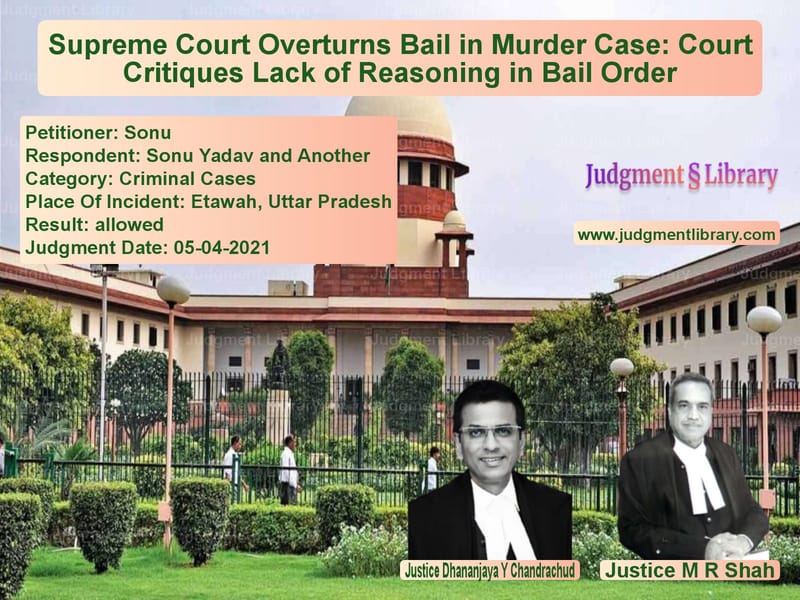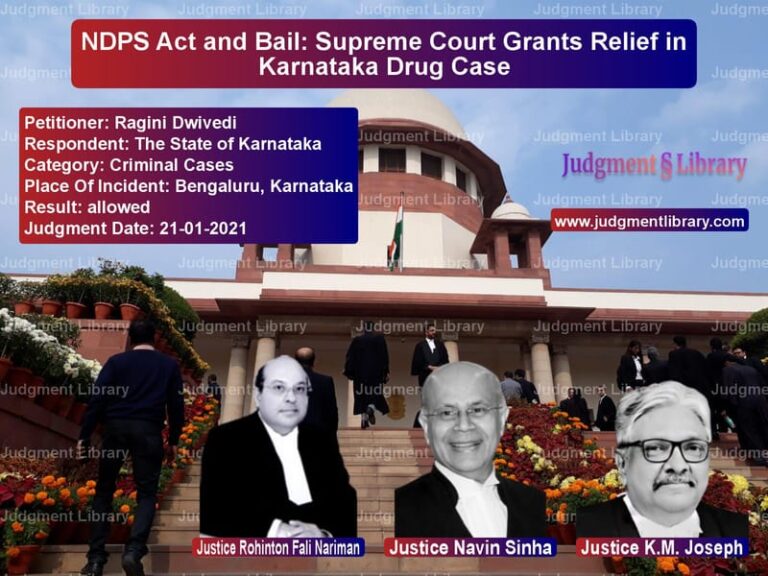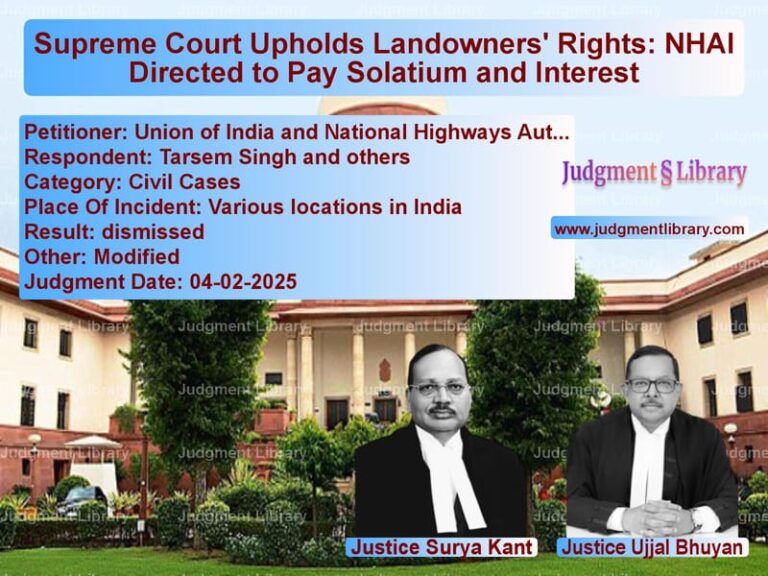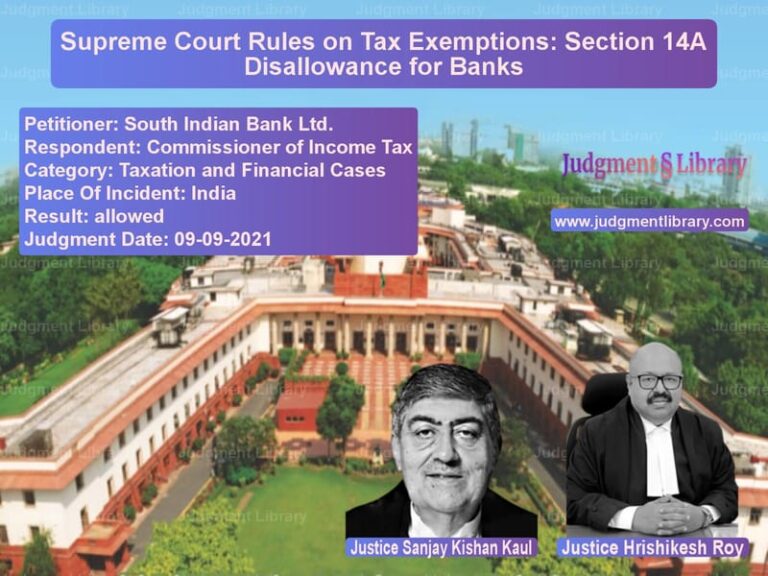Supreme Court Overturns Bail in Murder Case: Court Critiques Lack of Reasoning in Bail Order
The Supreme Court of India has recently ruled on the case of Sonu v. Sonu Yadav and Another, where it addressed the issue of bail in a murder case involving dowry harassment. The Court set aside the Allahabad High Court’s order granting bail to the first respondent in a dowry death case, emphasizing that the High Court had failed to provide adequate reasoning for granting bail and did not properly consider the seriousness of the offense.
Background of the Case
The case arose from an FIR filed on February 9, 2019, after the appellant (Sonu Yadav), the brother of the deceased woman, learned about her death. The woman had married the first respondent (her husband) in July 2018. According to the appellant’s complaint, the deceased was harassed by her husband and in-laws for additional dowry. The FIR alleged that a phone call was made to the appellant, informing him that if he wished to see his sister alive, he must arrange for Rs. 5 lakhs. Shortly afterward, the appellant received another phone call to take the dead body of his sister, which led to his discovery of her body in the district hospital. The appellant alleged that this was a case of dowry-related murder, as the deceased had been subjected to continuous harassment for dowry before her death.
Read also: https://judgmentlibrary.com/mukhtar-ansaris-custody-supreme-court-orders-transfer-to-uttar-pradesh/
Petitioner’s Arguments (Sonu, the Brother of the Deceased)
- The petitioner, Sonu Yadav, argued that the Allahabad High Court’s decision to grant bail to the first respondent was unjustified as it had not applied its mind to the seriousness of the offense.
- The petitioner contended that the allegations against the first respondent, including the demand for dowry and the phone calls made before and after the death of the victim, were serious enough to warrant continued detention.
- Sonu emphasized that the deceased had been harassed for dowry, and this fact was supported by the allegations made in the FIR, which included a clear demand for money.
- He also argued that the High Court had failed to provide a detailed reasoning for granting bail, which undermines the credibility of the judicial process.
Respondent’s Arguments (Sonu Yadav’s Brother-in-Law)
- The respondent’s counsel argued that the High Court had granted bail after considering the facts and circumstances of the case, which did not indicate any direct involvement in the murder.
- They contended that the deceased had a history of mental illness and had been under medical care before her death, which could explain the circumstances surrounding her death.
- The respondent’s counsel also claimed that there was no compelling evidence to suggest that the first respondent was involved in the death or that the dowry harassment claims were substantiated.
Supreme Court’s Analysis and Judgment
The Supreme Court evaluated the case thoroughly, paying special attention to the reasons provided by the High Court for granting bail. The Court emphasized the importance of a reasoned judgment, especially in cases involving serious allegations like dowry death and murder. The key observations made by the Court included:
- “The High Court granted bail without adequately considering the seriousness of the offense and the allegations of dowry harassment. The reasons provided by the High Court are insufficient and fail to address the gravity of the charges against the accused.”
- “It is well-established that when granting bail, the court must take into account the nature of the offense, the evidence available, and the potential impact on the trial. In this case, the High Court did not demonstrate such consideration.”
- “The fact that the deceased’s family had been subjected to dowry harassment, as alleged in the FIR, and the suspicious circumstances surrounding her death, make this a serious case, which warranted careful judicial scrutiny before granting bail.”
- “While bail is a right, it is also the court’s duty to ensure that the accused does not misuse it to delay the legal process or escape justice, especially in cases involving violent crime or death.”
The Court highlighted the lack of reasoning in the High Court’s bail order, emphasizing that judicial orders must reflect a careful evaluation of all relevant factors. The Court cited the case of Brij Nandan Jaiswal v. Munna Jaiswal, which established the principle that bail orders in serious cases must be supported by proper reasoning. The Court further noted that in this case, the High Court’s order lacked sufficient justification, and therefore, it was not in line with established legal principles.
In light of these observations, the Supreme Court allowed the appeal, set aside the High Court’s order granting bail, and directed the first respondent to surrender forthwith.
Key Legal Principles Reinforced by the Judgment
- Right to Bail vs. Nature of the Offense: The ruling emphasized that while bail is a right, it should be granted only after considering the severity of the crime and its impact on the judicial process.
- Judicial Reasoning in Bail Decisions: The judgment reinforced the principle that bail orders must be supported by sufficient reasoning, especially in cases involving serious allegations such as murder or dowry death.
- Importance of Fair Trial: The Court’s decision reaffirmed the importance of ensuring that accused individuals are not granted bail in cases where there is a risk of undermining the trial or delaying the justice process.
Impact of the Judgment
The judgment sends a clear message regarding the seriousness of bail decisions in criminal cases, particularly in those involving allegations of dowry harassment and murder. By stressing the importance of judicial reasoning, the Court ensured that bail cannot be granted arbitrarily or without a thorough examination of the facts and circumstances. The decision also reiterates that the principle of fair trial must guide all judicial decisions, especially in cases with serious implications for justice.
Conclusion
The Supreme Court’s ruling in Sonu v. Sonu Yadav emphasizes the significance of detailed reasoning in judicial decisions, particularly in the context of bail in serious criminal cases. The Court’s decision to set aside the High Court’s bail order reinforces the necessity of balancing the right to bail with the need for judicial scrutiny, ensuring that justice is served in the most severe cases.
Petitioner Name: Sonu.Respondent Name: Sonu Yadav and Another.Judgment By: Justice Dhananjaya Y Chandrachud, Justice M R Shah.Place Of Incident: Etawah, Uttar Pradesh.Judgment Date: 05-04-2021.
Don’t miss out on the full details! Download the complete judgment in PDF format below and gain valuable insights instantly!
Download Judgment: sonu-vs-sonu-yadav-and-anoth-supreme-court-of-india-judgment-dated-05-04-2021.pdf
Directly Download Judgment: Directly download this Judgment
See all petitions in Murder Cases
See all petitions in Bail and Anticipatory Bail
See all petitions in Domestic Violence
See all petitions in Judgment by Dhananjaya Y Chandrachud
See all petitions in Judgment by Mukeshkumar Rasikbhai Shah
See all petitions in allowed
See all petitions in supreme court of India judgments April 2021
See all petitions in 2021 judgments
See all posts in Criminal Cases Category
See all allowed petitions in Criminal Cases Category
See all Dismissed petitions in Criminal Cases Category
See all partially allowed petitions in Criminal Cases Category







